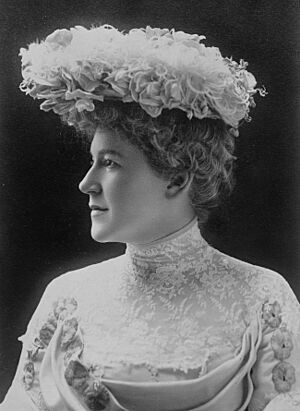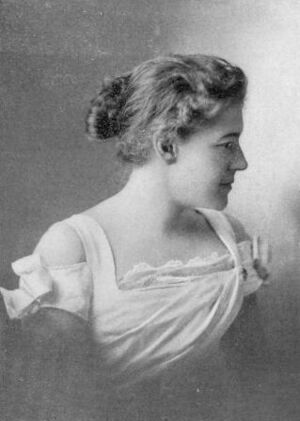Ella Wheeler Wilcox facts for kids
Quick facts for kids
Ella Wheeler Wilcox
|
|
|---|---|
 |
|
| Born | November 5, 1850 Johnstown, Wisconsin, U.S.
|
| Died | October 30, 1919 (aged 68) Short Beach, Connecticut, U.S.
|
| Occupation | Author, poet |
| Signature | |
Ella Wheeler Wilcox (born November 5, 1850 – died October 30, 1919) was a famous American author and poet. She is best known for her collection of poems called Poems of Passion. One of her most famous lines comes from her poem "Solitude": "Laugh, and the world laughs with you; weep, and you weep alone."
Ella wrote her life story, called The Worlds and I, which was published in 1918. This was just one year before she passed away.
Contents
Ella's Early Life and Writing
Ella Wheeler was born in 1850 on a farm in Johnstown, Wisconsin. She was the youngest of four children. Her family later moved north of Madison. This happened after her father lost money from bad business choices.
Ella's family valued being smart and using the English language well. As a child, Ella loved to read books and newspapers. This reading helped her become a writer later on. She enjoyed stories like those by William Shakespeare and The Arabian Nights.
Becoming a Poet
Around age 8, Ella started writing poetry as a way to express herself. When she was 13, her very first poem was published. She wanted to get her work printed so she could receive a copy of the newspaper it was in.
By the time she finished high school, Ella was already known as a poet in her home state.
The Story Behind "Solitude"
Her famous poem "The Way of the World" was first printed on February 25, 1883. The idea for this poem came to her while she was traveling to a special ball in Madison, Wisconsin. On the train, she saw a young woman crying.
Ella sat with the woman and tried to comfort her. When they arrived, Ella felt sad herself. She looked in a mirror and thought about the sorrowful woman. At that moment, she wrote the first lines of "Solitude":
- Laugh, and the world laughs with you;
- Weep, and you weep alone.
- For the sad old earth must borrow its mirth
- But has trouble enough of its own
She sent the poem to a newspaper and earned $5. Soon after, it was included in her book Poems of Passion. This book earned a lot of money, about $2000, that year.
Marriage and Later Life
In 1884, Ella married Robert Wilcox. They lived in Meriden, Connecticut, then New York City, and finally in Short Beach in Branford, Connecticut. They built two homes by Long Island Sound. These homes became known as Bungalow Court, where they hosted many writer and artist friends.
Ella and Robert had one son, but he sadly died soon after birth. After they married, both Ella and Robert became interested in ideas about positive thinking and life after death.
Coping with Loss
Robert Wilcox passed away in 1916, after more than 30 years of marriage. Ella was very sad. She had hoped to receive a message from him from the spirit world, as they had promised each other. When no message came, she was very upset.
She visited a wise man named Max Heindel. He explained that intense sadness can make it hard to connect with spirits. He told her that like a cloudy pool cannot reflect the sky, a troubled mind cannot receive messages. He said that when her sorrow calmed, she would be able to connect.
Ella later created a special prayer to help her cope. She repeated it often: "I am the living witness: The dead live: And they speak through us and to us: And I am the voice that gives this glorious truth to the suffering world: I am ready, God: I am ready, Christ: I am ready, Robert."
Spreading Positive Ideas
Ella wanted to share her positive ideas with the world. Her writings, full of positive thinking, were very popular. By 1915, her small book, What I Know About New Thought, had sold 50,000 copies.
Ella believed that our thoughts and actions today shape our future. She wrote: "As we think, act, and live here today, we build the structures of our homes in spirit realms after we leave earth, and we build karma for future lives... Life will assume new dignity... when we come to the knowledge that death is but a continuation of life and labor, in higher planes."
Her autobiography, The Worlds and I, ends with these thoughts: "From this mighty storehouse (of God, and the hierarchies of Spiritual Beings) we may gather wisdom and knowledge, and receive light and power, as we pass through this preparatory room of earth, which is only one of the innumerable mansions in our Father's house. Think on these things."
Ella also strongly supported animal rights and vegetarianism. She died from cancer on October 30, 1919, in Short Beach, Connecticut.
Ella's Famous Poetry
Even though some experts didn't include her work in major poetry books, many people loved Ella's poems. Fourteen of her poems were chosen for Best Loved Poems of the American People. Two of her poems, "The Way Of The World" and "The Winds of Fate," were picked for Best Remembered Poems.

One of her well-known poems is "The Man Worth While." It starts like this:
- It is easy enough to be pleasant,
- When life flows by like a song,
- But the man worth while is one who will smile,
- When everything goes dead wrong.
Her poem "Solitude" begins:
- Laugh and the world laughs with you,
- Weep, and you weep alone;
- The good old earth must borrow its mirth,
- But has trouble enough of its own.
Another popular poem is The Winds of Fate:
- One ship drives east and another drives west
- With the selfsame winds that blow.
- 'Tis the set of the sails,
- And Not the gales,
- That tell us the way to go.
- Like the winds of the sea are the ways of fate;
- As we voyage along through life,
- 'Tis the set of a soul
- That decides its goal,
- And not the calm or the strife.
Ella cared deeply about animals. This is clear in her poem "Voice of the Voiceless." It starts with these lines:
- So many gods, so many creeds,
- So many paths that wind and wind,
- While just the art of being kind
- Is all the sad world needs.
- I am the voice of the voiceless;
- Through me the dumb shall speak,
- Till the deaf world’s ear be made to hear
- The wrongs of the wordless weak.
- From street, from cage, and from kennel,
- From stable and zoo, the wail
- Of my tortured kin proclaims the sin
- Of the mighty against the frail.
During World War I, Ella visited France. She recited her poem, The Stevedores, to a group of 9,000 US Army workers.
Works by Ella Wheeler Wilcox
Poetry Collections
- Poems of Passion (1883)
- Drops of Water (1889)
- Maurine and other Poems (1888)
- Poems of Pleasure (1888)
- Poems of Reflection (1905)
- Poems of Cheer (1908)
- Poems of Progress and New Thought Pastels (1909)
- Poems of Affection (1920)
- Poems of Life (1921)
Novels
- Mal Moulée: A Novel (1885)
- A Double Life (1890)
- Sweet Danger (1892)
- A Woman of the World: Her Counsel to Other People's Sons and Daughters (1904)
Plays
- Mizpah (1906)
Other Writings
- The Heart of New Thought (1902)
- The Story of a Literary Career (1905)
- The Worlds and I (1918)
Film Adaptations
Some of Ella's poems were made into silent films:
- The Price He Paid (1914)
- The Beautiful Lie (1917)
- The Belle of the Season (1919)
- The Man Worth While (1921)
 | Precious Adams |
 | Lauren Anderson |
 | Janet Collins |


